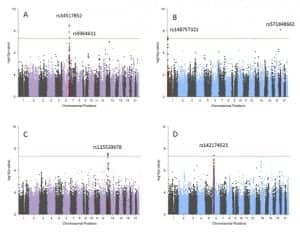A recent international study has identified genomewide genetic loci associated with the risk of posttraumatic stress disorder (PTSD), according to researchers at Cohen Veterans Bioscience (CVB), a nonprofit organization dedicated to advancing brain health through data-driven science, and the Stanley Center for Psychiatric Research at the Broad Institute at MIT and Harvard.1
PTSD is the most commonly occurring and seriously impairing disorder that occurs after exposure to traumatic events, such as combat, natural disaster, and sexual assault. According to the World Health Organization, an estimated 3.6% of the world’s population suffers from PTSD in a given year. Trauma-related disorders are also a major contributor to risk for suicide—a devastating outcome affecting as many as 20 US veterans per day.
The risk of developing PTSD after experiencing trauma is heritable, but robust genetic markers had not previously been identified. Through a global research collaboration, analyses were conducted on data and samples collected from multiethnic cohorts that included more than 30,000 people with PTSD and 170,000 control cases. The researchers were able to demonstrate significant genetic correlations across 60 PTSD cohorts, including a UK biobank dataset.
In this largest meta-analysis of PTSD to date, three genomewide significant risk loci were identified, two in European and one in African-ancestry analyses. When analyzing the data based on sex, an additional three risk loci were identified in men—two in European and one in African ancestry. Along with other novel genes and noncoding RNAs, a Parkinson’s disease gene involved in dopamine regulation, PARK2, was associated with PTSD. Consistent with previous reports, single nucleotide polymorphism-based heritability estimates for PTSD range between 5% and 20%. Such heritability estimates are similar to rates observed for major depression.

The study results demonstrate that genetic variation contributes to the biology of differential risk for PTSD, and provide an essential foothold for advancing the broader goal of understanding disease pathways for preventing and treating the devastating impact of PTSD, including suicide.
“These findings underscore the role and importance of better understanding the biological mechanisms and genetic risks associated with PTSD to help drive breakthroughs in prevention and treatment,“ says Magali Haas, MD, PhD, CEO and president of CVB. “This landmark study is also a testament to the power of team science to dramatically accelerate progress by expanding access to PTSD cases, and to provide genetically diverse samples for robust genetic results.“
A critical factor in the success of the program was the centralization and access to high-performance bioassays and analytic pipelines supported by the Broad Institute. In the spirit of open science, the full meta-analyses summary statistics are available for download from the Psychiatric Genomics Consortium.
For further information, visit Cohen Veterans Bioscience.
References
- Nievergelt CM, Maihofer AX, Klengel T, et al. International meta-analysis of PTSD genomewide association studies identifies sex- and ancestry-specific genetic risk loci. Nat Commun. 2019;10(1):4558; doi:10.1038/s41467-019-12576-w.
- Gelernter J, Sun N, Polimanti R, et al. Genomewide association study of posttraumatic stress disorder reexperiencing symptoms in >165,000 US veterans. Nat Neurosci. 2019;22(9):1394–1401; doi: 10.1038/s41593-019-0447-7.
Featured image:
PTSD theme image by Susanna M. Hamilton, Broad Communications, courtesy Cohen Veterans Bioscience.






